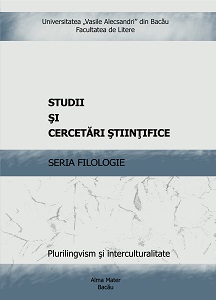GENERAȚIA PIERDUTĂ: LITERATURA ANTIUTOPIEI
The Lost Generation: A Dystopian Literature
Author(s): Diana ZahariaSubject(s): Language and Literature Studies, Studies of Literature, Romanian Literature, Philology
Published by: Editura Alma Mater
Keywords: lost generation; utopia dystopia; escape evasion; communist paradise;
Summary/Abstract: The paper, entitled The Lost Generation: A Dystopian Literature, follows the idea that the literary period 1944−1947 generates an art profoundly influenced by an apocalyptic feeling. An ending, marked by the Second World War and by the Antonescian dictatorship, along with the beginning of the communist dictatorship, produces a limitative space where the first literary imperative is the release from any form of political utopia. This will cause, particularly in prose, the appearance of several negative utopias. Whether these fictions are creative works from the ,,shelf”, from exile or forbidden literature beginning with 1948, they all create a dystopian literature – an answer given by the young literary generation who experienced the effects of the utopian sentence ,,War is peace.”Thus, what we intend to discuss in this paper is an extended answer to the assumption that, before this lost generation, there was no other moment in Romanian literature when history was reflected with so much precision in fiction, therefore creating dystopian discourses in so many different forms. In the first part of our paper, a summary of the dystopian field can reveal the similarities it shares with the utopia itself– it is a reversed utopia, permanently reflecting its model – but also the fundamental differences between the two – the differences show once more that, while negative utopias can be found in our country ever since medieval times, the great utopias were always of a foreign origin. In addition, we will attempt to show in what measure the negative utopia represents a distinct literary species for the lost generation. The second part of our paper is dedicated to several case studies centered on the fictions which, alongside their authors, support the fictional necessity for a negative utopia as a means to escape from the limitative real universe. The meanings of escape/ evasion in fiction are not limited to the dystopia. It only provides the framework to acknowlegde some of the most brilliant fictions of the lost generation: The Blockade, by Pavel Chihaia (the picturesque dystopia), Euridice. 8 short stories, by Petru Dumitriu (the mythologycal dystopia), The Built Windows, by Al. Vona (the ailing dystopia), The Leaves Are Not the Same, by Mihail Villara (the political dystopia).
Journal: Studii și cercetări științifice. Seria filologie
- Issue Year: 2018
- Issue No: 39
- Page Range: 99-112
- Page Count: 13
- Language: Romanian

